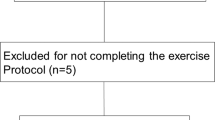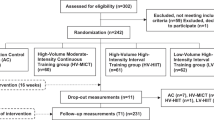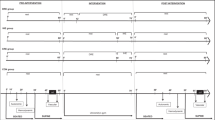Abstract
The acute decrease in blood pressure (BP) observed after a session of exercise (called post-exercise hypotension) has been proposed as a tool to predict the chronic reduction in BP induced by aerobic training. Therefore, this study investigated whether post-exercise hypotension observed after a maximal exercise test is associated to the BP-lowering effect of aerobic training in treated hypertensives. Thirty hypertensive men (50 ± 8 years) who were under consistent anti-hypertensive treatment underwent a maximal exercise test (15 watts/min until exhaustion), and post-exercise hypotension was determined by the difference between BP measured before and at 30 min after the test. Subsequently, the patients underwent 10 weeks of aerobic training (3 times/week, 45 min/session at moderate intensity), and the BP-lowering effect of training was assessed by the difference in BP measured before and after the training period. Pearson correlations were employed to evaluate the associations. Post-maximal exercise test hypotension was observed for systolic and mean BPs (−8 ± 6 and −2 ± 4 mmHg, all P < 0.05). Aerobic training reduced clinic systolic/diastolic BPs (−5 ± 6/−2 ± 3 mmHg, both P < 0.05) as well as awake and 24 h mean BPs (−2 ± 6 and −2 ± 5 mmHg, all P < 0.05). No significant correlation was detected between post-exercise hypotension and the BP-lowering effect of training either for clinic or ambulatory BPs (r values ranging from 0.00 to 0.32, all p > 0.05). Post-exercise hypotension assessed 30 min after a maximal exercise test cannot be used to predict the BP-lowering effect of aerobic training in treated hypertensive men.
This is a preview of subscription content, access via your institution
Access options
Subscribe to this journal
Receive 12 digital issues and online access to articles
$119.00 per year
only $9.92 per issue
Buy this article
- Purchase on Springer Link
- Instant access to full article PDF
Prices may be subject to local taxes which are calculated during checkout


Similar content being viewed by others
Data availability
Additional data will be provided by the corresponding author on reasonable request.
References
Mills KT, Stefanescu A, He J. The global epidemiology of hypertension. Nat Rev Nephrol. 2020;16:223–37.
Thoenes M, Neuberger H-R, Volpe M, Khan BV, Kirch W, Böhm M. Antihypertensive drug therapy and blood pressure control in men and women: an international perspective. J Hum Hypertens. 2010;24:336–44.
Barroso WKS, Rodrigues CIS, Bortolotto LA, Mota-Gomes MA, Brandão AA, Feitosa AD, et al. Diretrizes Brasileiras de Hipertensão Arterial – 2020. Arq Bras Cardiol. 2021;116:516–658.
Chobanian AV, Bakris GL, Black HR, Cushman WC, Green LA, Izzo JL, et al. Seventh report of the joint national committee on prevention, detection, evaluation, and treatment of high blood pressure. Hypertension. 2003;42:1206–52.
Williams B, Mancia G, Spiering W, Rosei EA, Azizi M, Burnier M, et al. 2018 ESC/ESH Guidelines for the management of arterial hypertension. Eur Heart J. 2018;39:3021–104.
Cao L, Li X, Yan P, Wang X, Li M, Li R, et al. The effectiveness of aerobic exercise for hypertensive population: a systematic review and meta‐analysis. J Clin Hypertens. 2019;21:868–76.
Naci H, Salcher-Konrad M, Dias S, Blum MR, Sahoo SA, Nunan D, et al. How does exercise treatment compare with antihypertensive medications? A network meta-analysis of 391 randomised controlled trials assessing exercise and medication effects on systolic blood pressure. Br J Sports Med. 2019;53:859–69.
Hagberg JM, Park J-J, Brown MD. The role of exercise training in the treatment of hypertension. Sport Med. 2000;30:193–206.
Carpio-Rivera E, Moncada-Jiménez J, Salazar-Rojas W, Solera-Herrera A. Acute effects of exercise on blood pressure: a meta-analytic investigation. Arq Bras Cardiol. 2016;106:422–33.
Brito LC, Fecchio RY, Peçanha T, Andrade-Lima A, Halliwill JR, Forjaz CLM. Postexercise hypotension as a clinical tool: a “single brick” in the wall. J Am Soc Hypertens. 2018;12:e59–e64.
Luttrell MJ, Halliwill JR. Recovery from exercise: vulnerable state, window of opportunity, or crystal ball? Front Physiol. 2015;6:204.
ACSM’s Guidelines for Exercise Testing and Prescription. 10th ed. Wolters Kluwer Health: Philadelphia, 2017.
Hecksteden A, Grütters T, Meyer T. Association between postexercise hypotension and long-term training-induced blood pressure reduction. Clin J Sport Med. 2013;23:58–63.
Wegmann M, Hecksteden A, Poppendieck W, Steffen A, Kraushaar J, Morsch A, et al. Postexercise hypotension as a predictor for long-term training-induced blood pressure reduction: a large-scale randomized controlled trial. Clin J Sport Med. 2018;28:509–15.
Headley S, Germain M, Wood R, Joubert J, Milch C, Evans E, et al. Blood pressure response to acute and chronic exercise in chronic kidney disease. Nephrology. 2017;22:72–78.
Barnett AG. Regression to the mean: what it is and how to deal with it. Int J Epidemiol. 2004;34:215–20.
Pearson K. Mathematical contributions to the theory of evolution.—On a form of spurious correlation which may arise when indices are used in the measurement of organs. Proc R Soc Lond. 1897;60:489–98.
Brito LC, Peçanha T, Fecchio RY, Rezende RA, Sousa P, Da Silva-Júnior N, et al. Morning versus evening aerobic training effects on blood pressure in treated hypertension. Med Sci Sport Exerc. 2019;51:653–62.
Horne JA, Ostberg O. A self-assessment questionnaire to determine morningness-eveningness in human circadian rhythms. Int J Chronobiol. 1976;4:97–110.
Benedetti TRB, Antunes PC, Rodriguez-Añez CR, Mazo GZ, Petroski EL. Reprodutibilidade e validade do Questionário Internacional de Atividade Física (IPAQ) em homens idosos em homens idosos. Rev Bras Med do Esport. 2007;13:11–6.
Skinner JS, McLellan TH. The transition from aerobic to anaerobic metabolism. Res Q Exerc Sport. 1980;51:234–48.
Ettehad D, Emdin CA, Kiran A, Anderson SG, Callender T, Emberson J, et al. Blood pressure lowering for prevention of cardiovascular disease and death: a systematic review and meta-analysis. Lancet. 2016;387:957–67.
de Brito LC, Fecchio RY, Peçanha T, Lima A, Halliwill J, Forjaz CL, et al. Recommendations in post-exercise hypotension: concerns, best practices and interpretation. Int J Sports Med. 2019;40:487–97.
Sosner P, Guiraud T, Gremeaux V, Arvisais D, Herpin D, Bosquet L. The ambulatory hypotensive effect of aerobic training: a reappraisal through a meta-analysis of selected moderators. Scand J Med Sci Sports. 2017;27:327–41.
Saco‐Ledo G, Valenzuela PL, Ruiz‐Hurtado G, Ruilope LM, Lucia A. Exercise reduces ambulatory blood pressure in patients with hypertension: a systematic review and meta‐analysis of randomized controlled trials. J Am Heart Assoc. 2020;9:18487.
Liu S, Goodman J, Nolan R, Lacombe S, Thomas SG. Blood pressure responses to acute and chronic exercise are related in prehypertension. Med Sci Sport Exerc. 2012;44:1644–52.
Acknowledgements
The authors thank the volunteers for participating and Dr. Sean M. Rice from the Oregon Health & Science University for statistical assistance.
Funding
This study was supported by Fundação de Amparo à Pesquisa do Estado de São Paulo (FAPESP 2014/216676-6), Programa de Excelência Acadêmica (PROEX 88882.327719/2019-01), Conselho Nacional de Desenvolvimento Científico e Tecnológico (CNPq 304436/2018-6), and Coordenação de Aperfeiçoamento Pessoal de Nível Superior–Brasil (CAPES, financial code 0001).
Author information
Authors and Affiliations
Contributions
LMA and LCB collaborate to the study design, collected data, carried out the statistical analysis, contributed to the interpretation of results, and drafted the initial manuscript; TP, RYF, RAR collected data, and revised the manuscript; GVS, APA, DMJ were responsible for patients clinical evaluation and follow-up, and revised the manuscript; JRH contributed to the interpretation of results and revised the manuscript; CLMF designed the study, get grants for the study, supervised data collection, contributed to the interpretation of results and revised the manuscript. All authors gave final approval of the manuscript version submitted for publication.
Corresponding author
Ethics declarations
Competing interests
The authors declare no competing interests.
Ethical approval
All patients signed a written consent form. The study from which data of the present investigation was derived was approved by the Research Ethical Committee of the School of Physical Education and Sport (no. 966.072) and registered in the Brazilian Clinical Trials platform (RBR-7q7pz7), and its procedures followed the standards proposed by the Helsinki Declaration.
Additional information
Publisher’s note Springer Nature remains neutral with regard to jurisdictional claims in published maps and institutional affiliations.
Rights and permissions
Springer Nature or its licensor (e.g. a society or other partner) holds exclusive rights to this article under a publishing agreement with the author(s) or other rightsholder(s); author self-archiving of the accepted manuscript version of this article is solely governed by the terms of such publishing agreement and applicable law.
About this article
Cite this article
Azevêdo, L.M., Brito, L.C.d., Peçanha, T. et al. Can blood pressure decrease after maximal exercise test predict the blood pressure lowering effect of aerobic training in treated hypertensive men?. J Hum Hypertens 37, 1070–1075 (2023). https://doi.org/10.1038/s41371-023-00853-7
Received:
Revised:
Accepted:
Published:
Issue Date:
DOI: https://doi.org/10.1038/s41371-023-00853-7



